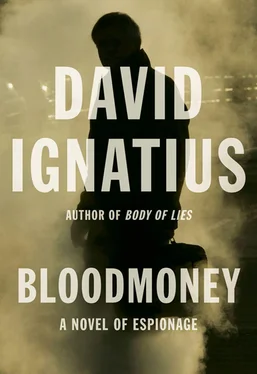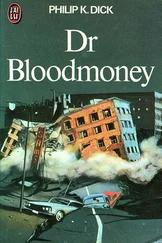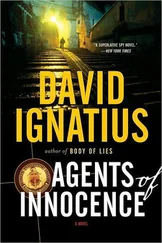David Ignatius - Bloodmoney
Здесь есть возможность читать онлайн «David Ignatius - Bloodmoney» весь текст электронной книги совершенно бесплатно (целиком полную версию без сокращений). В некоторых случаях можно слушать аудио, скачать через торрент в формате fb2 и присутствует краткое содержание. Жанр: Шпионский детектив, на английском языке. Описание произведения, (предисловие) а так же отзывы посетителей доступны на портале библиотеки ЛибКат.
- Название:Bloodmoney
- Автор:
- Жанр:
- Год:неизвестен
- ISBN:нет данных
- Рейтинг книги:4 / 5. Голосов: 1
-
Избранное:Добавить в избранное
- Отзывы:
-
Ваша оценка:
- 80
- 1
- 2
- 3
- 4
- 5
Bloodmoney: краткое содержание, описание и аннотация
Предлагаем к чтению аннотацию, описание, краткое содержание или предисловие (зависит от того, что написал сам автор книги «Bloodmoney»). Если вы не нашли необходимую информацию о книге — напишите в комментариях, мы постараемся отыскать её.
Bloodmoney — читать онлайн бесплатно полную книгу (весь текст) целиком
Ниже представлен текст книги, разбитый по страницам. Система сохранения места последней прочитанной страницы, позволяет с удобством читать онлайн бесплатно книгу «Bloodmoney», без необходимости каждый раз заново искать на чём Вы остановились. Поставьте закладку, и сможете в любой момент перейти на страницу, на которой закончили чтение.
Интервал:
Закладка:
Just so, said the Pakistani professor. Close a circle. They discussed where they might meet. Neutral ground, where they would both feel secure: a park outside the city. The American suggested Kew Gardens, at the far western end of London, a particular remote area of the park that he named.
The Pakistani made several other requests of the American, naming other people who should be part of their meeting. It was a question of gundi, he said. He did not bother to translate the word, and the other man did not ask, but it meant “balance” in the Pashto language.
38
Cyril Hoffman’s office was on the celestial seventh floor at Headquarters, but not on the fashionable side that looked out over the trees toward the Potomac. That view was afforded to the director and his deputies for operations and analysis, but not to the humble cleanup man, the associate deputy director, the one who kept the place running while the high-flyers and the A-students were off taking credit. His office looked the other way, toward the cafeteria and the dull facade of the new Headquarters building and beyond to the acres of parking lots, cutely named in bright colors: blue, green, yellow, purple.
Hoffman gorged on his unfashionableness and indispensability. He knew the real secrets that kept the place running-where the money flowed, how the safe houses were acquired, where the air assets were sheltered, how their tail numbers were disguised. He understood what his flamboyant relatives in the agency had never realized: Power was not one big thing, but an accumulation of little things.
This was a good day for Hoffman. The systems that he and Sophie Marx had set in motion to track their quarry had worked. For as Hoffman liked to say: Finding a needle in a haystack was not as hard as it sounded, if you had a thread tied to the needle. It was a matter of fusing the lookers and the finders-or, in intelligence parlance, the analysts and the operators. Hoffman had launched this process of location and discovery when he received the operational plan from Marx in Belgium.
This CIA did many things wrong, but it understood this humble job of identifying targets. The targeters were not the “chosen ones” from the Clandestine Service, or “knuckle-draggers” from Ground Branch, but Hoffman’s people, the nerds and geeks in the Science and Technology Directorate who thought up the gadgets, the clods in Support who put them in the right places, and the analysts from the Directorate of Intelligence who figured out what the information meant.
Every day, teams of analysts prepared lists for the Joint Special Operations Command. They could map a country’s entire telephone network, and overlay the patterns of who had called whom until the Al-Qaeda pockets glowed like Christmas tree lights; they could find the location of a particular cellular handset “of interest” down to the meter, and once they had located the target, they could track it with persistent surveillance and strike when the moment was opportune.
For a few deadly weeks, this process of discovery had eluded the agency because it lacked the right coordinates to program into this architecture of discovery. But now the pieces had combined. The email message from “George White” at Yahoo was monitored instantly through a Yahoo server in the United States. It had taken a little longer to locate the computer in Karachi where the message had originated, but soon enough they had it, and the Information Operations Center in Langley had been able to monitor other messages being sent to and from that computer. Calls to U.S. cell phones were harder to track because of legal limitations, but the rest was easy.
When the analysts called Hoffman to report that they had identified their target, he knew that it was essential to take action to remove this target as quickly as possible, but also in an appropriate way. He roused his CIA colleagues in Karachi, Islamabad and Dubai. He alerted the JSOC liaison at Headquarters to get military assets ready. He had one more essential call, but it could wait a few minutes. First, he wanted to reward himself for his unsung mastery.
He sent his secretary down to the cafeteria to purchase a cup of soft-serve ice cream, a chocolate and vanilla swirl. Some men, when they want to celebrate, might do something reckless-buy themselves a night with a fancy hooker, or get fall-down drunk in public. But Hoffman’s pleasures were gentler. When the ice cream arrived, he took from his desk a package of oatmeal cookies and crumbled one on top of the ice cream, to add a crunchy texture to the cool on his tongue.
When he finished his ice cream, Hoffman placed the call to Sophie Marx in Belgium. She was still at the villa on the edge of the NATO compound, awaiting approval to travel to Dubai. She had been dozing, allowing herself the pleasure of an afternoon nap, but she braced up when she heard the voice on the other end of the line.
“We’ve got him,” said Hoffman. “You can unpack your bag and relax.”
She was speechless for a moment. When you’ve wanted something badly, it’s hard to believe that it has really happened.
“Thank God,” she said. “Who the hell is he?”
“He’s a Pakistani computer scientist named Omar al-Wazir. The analysts are still assembling the file, but from what we know he’s a Pashtun, some kind of a computer genius. He travels all over. He’s in Karachi now, working out of one of the universities there, but he’s based at the National University of Science and Technology in Islamabad. I don’t think you’re in his sights anymore. His main concern right now would be staying alive, I would think.”
“Can we grab him? I want this guy in a box.”
“I don’t think capture would be the right solution here. We’re doing a little of this and that. The consulate sent a team last night to the university. Surveillance-plus, shall we say. Islamabad station found another spot where he stayed in the past and sent a team there. We fired a few warning shots, you might say.”
“Have you told the Paks?”
“Goodness, no. I make it a rule never to tell General Malik anything unless it’s for the purpose of deceiving him. That’s the way he treats me, invariably. I will have to tell him something, sooner or later. We need help in dismantling the good Dr. Omar’s underground network. We can’t kill them all ourselves.”
“What have you got on the network?”
“We have identified two people in Dubai, thanks to his messages. The UAE will arrest them at dawn. We’re analyzing old message traffic, from Professor al-Wazir and anybody he has touched. Each time we get a good name, we will take them down.”
“You are the ayatollah, Mr. Hoffman.”
“Thank you, but I haven’t told you the most interesting part. We have been running checks on Dr. Omar’s contacts with Americans, and guess who turns up in our first run-through? It’s a bit upsetting, I have to warn you.”
She knew the answer. She felt as if she had known it for days, maybe weeks.
“Jeff Gertz,” she muttered.
“Clever girl! How did you know, pray tell?”
“It had to be him. From what Joseph Sabah told me about the consultants, I figured there must have been contact between Gertz and the Pakistani. I just didn’t want it to be true.”
“Well, believe it,” said Hoffman. “Jeffrey has stepped on a rather large turd, I’m afraid.”
“What have you got on him?”
“Not much as yet. The analysts have just started looking. But there were regular chats, it seems. This is rather sensitive, as you can imagine. It’s embarrassing for us; the White House, too. But we’ll pry it loose, and then take a look at it. The White House will want to limit damage, no doubt, and I’m sure they will understand better the case for strengthening the agency that I have been making on behalf of the director.”
Читать дальшеИнтервал:
Закладка:
Похожие книги на «Bloodmoney»
Представляем Вашему вниманию похожие книги на «Bloodmoney» списком для выбора. Мы отобрали схожую по названию и смыслу литературу в надежде предоставить читателям больше вариантов отыскать новые, интересные, ещё непрочитанные произведения.
Обсуждение, отзывы о книге «Bloodmoney» и просто собственные мнения читателей. Оставьте ваши комментарии, напишите, что Вы думаете о произведении, его смысле или главных героях. Укажите что конкретно понравилось, а что нет, и почему Вы так считаете.












